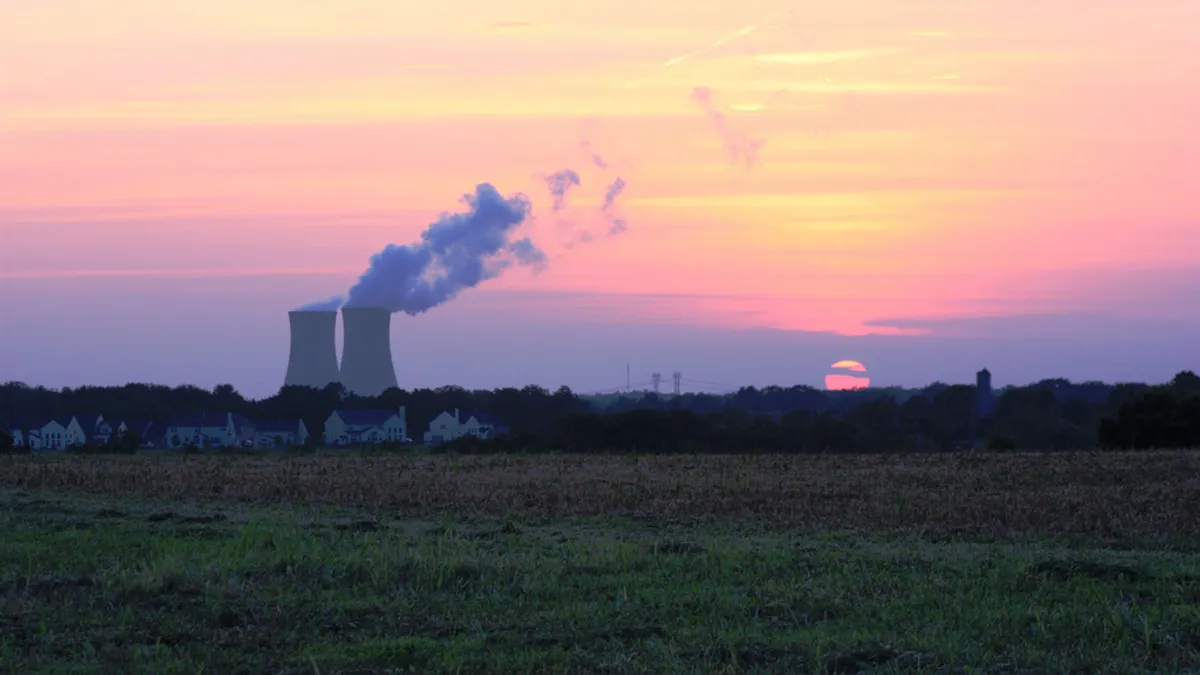Dive Brief:
-
The Federal Energy Regulatory Commission and Department of Justice filed a joint legal brief in support of Illinois nuclear subsidies on Tuesday.
-
Lawyers for the two agencies wrote the zero emission credits (ZECs) for Illinois nuclear plants do not interfere with FERC’s authority to regulate wholesale power markets, as generators claimed. If the subsidies disrupt market operations, “the solution lies with the Commission, not the courts,” the agencies wrote.
-
The legal opinion will likely also apply to a pending court challenge against New York nuclear subsidies, as well as a New Jersey subsidy program enacted last week. The FERC opinion could also make a Supreme Court case over the subsidies less likely, analysts say.
Dive Insight:
The Tuesday amicus brief from FERC and DOJ is a blow for opponents of nuclear subsidies, who hoped the courts would throw out the recent state programs designed to keep uneconomic plants from retiring.
In their brief, filed with the U.S. Court of Appeals for the Seventh Circuit, FERC and DOJ write the Illinois program does not suffer from the "fatal defect" that doomed other state subsidy programs in the courts.
In 2016, the Supreme Court ruled that a Maryland policy to support gas generation interfered with FERC’s authority because it made receipt of a subsidy contingent on wholesale market participation, which FERC regulates.
The Illinois nuclear subsidies are different, DOJ and FERC argued, valuing the nuclear plants’ zero carbon generation regardless of whether they clear power market auctions.
“Generators may receive ZECs even if they do not clear the capacity auctions conducted by the two FERC-jurisdictional market operators in Illinois,” they wrote. “The ZECs are separate commodities that represent the environmental attributes of a particular form of power generation; they are not payments for, or otherwise bundled with, sales of energy or capacity at wholesale, and thereby fall outside of FERC’s exclusive jurisdiction over wholesale transactions.”
If the nuclear subsidies do interfere with wholesale market operations, the agencies wrote that FERC is the appropriate place to find solutions, rather than the courts.
"The Commission can exercise its responsibility under the Federal Power Act to ensure just and reasonable prices in the wholesale markets subject to its jurisdiction," they wrote. "The Court thus need not, and should not, resort here to the extraordinary and blunt remedy of preemption."
Evaluating methods to integrate state energy policies into wholesale markets has been a focus at FERC in recent years — and also a point of contention. In March, the commission approved an ISO-New England plan to change its capacity market auctions to handle subsidized resources, but the 3-2 vote exposed divides between regulators on how to handle future cases.
Those issues are likely to come to a head next month, when FERC is scheduled to rule on two market reform options submitted by the PJM Interconnection — both of which could diminish the market impact of nuclear and renewable energy subsidies.
In the meantime, analysts say the FERC-DOJ brief makes it more likely the nuclear subsidies will be upheld by the courts — not just the Seventh Circuit, but also the U.S. Court of Appeals for the Second Circuit, which is hearing a similar challenge against the New York program.
"Since the Second Circuit indicated that it would not likely rule until FERC responded to the Seventh Circuit, we expect read through to the New York case to be very strong," Timothy Fox, vice president at ClearView Energy Partners wrote in a client note. "Therefore, we think yesterday’s brief bodes well for both the Illinois and New York programs being upheld by the respective appellate circuits, and expect that the recently enacted New Jersey nuclear program faces low risk of judicial reversal."
If opponents seek an appeal to the Supreme Court, Fox gives them "low odds of success given FERC’s position that it has sufficient jurisdiction to address the issues raised."













